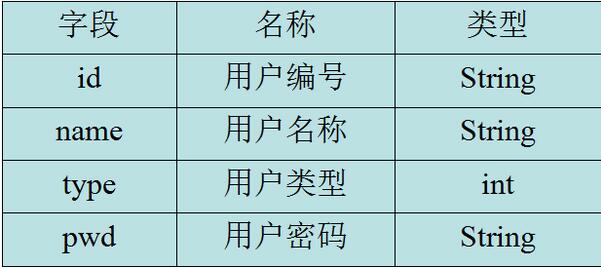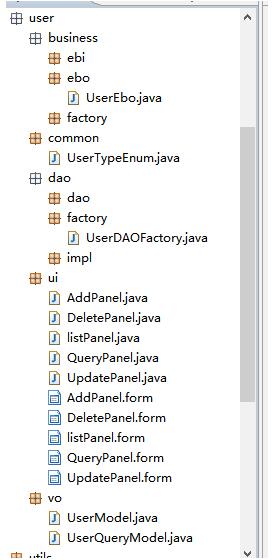本文實例為大家分享了java書店系統(tǒng)畢業(yè)設(shè)計第二篇,供大家參考,具體內(nèi)容如下
1、用戶管理(user.txt)
字段名和順序

說明:其中的type為int類型,用來表示操作用戶的類型。
1——表示為admin,可以進(jìn)行全部操作
2——表示為能操作圖書模塊的人員
3——表示為能操作進(jìn)貨模塊的人員
4——表示為能操作銷售模塊的人員
5——表示為能操作庫存模塊的人員

type用了枚舉實現(xiàn)
|
1
2
3
4
5
6
7
8
9
10
11
12
13
14
15
16
17
18
19
20
21
22
23
24
25
26
27
28
29
30
31
32
33
34
|
package cn.hncu.bookStore.user.common;public enum UserTypeEnum { AdMIN(1,"超級管理員"),BOOK(2,"圖書管理員"),IN(3,"進(jìn)貨管理員"),OUT(4,"銷售管理員"),STOCK(5,"庫存管理員"); private final int type; private final String name; UserTypeEnum(int type,String name){//默認(rèn)private this.name =name; this.type=type; } public int getType() { return type; } public String getName() { return name; } public static int getTypeByName(String name){ for(UserTypeEnum utm:UserTypeEnum.values()){ if(utm.getName().equals(name.trim())){ return utm.getType(); } } throw new IllegalArgumentException("沒有該\""+name+"\"對應(yīng)的用戶類型");//非法參數(shù)異常 } public static String getNameByType(int type){ for(UserTypeEnum utm:UserTypeEnum.values()){ if(utm.getType()==type){ return utm.getName(); } } throw new IllegalArgumentException("沒有該\""+type+"\"對應(yīng)的用戶類型");//非法參數(shù)異常 }} |
|
1
2
3
4
5
6
7
8
9
10
11
12
13
14
15
16
17
18
19
20
21
22
23
24
25
26
27
28
29
30
31
32
33
34
35
36
37
38
39
40
41
42
43
44
45
46
47
48
49
50
51
52
53
54
55
56
57
58
59
60
61
62
63
64
65
|
package cn.hncu.bookStore.user.vo;import java.io.Serializable;import cn.hncu.bookStore.user.common.UserTypeEnum;/** * *@author<a href="mailto:[email protected]">xzm</a> */public class UserModel implements Serializable{ private static final long serialVersionUID = 1L; private String uuid,name,pwd;//用戶編號,用戶名稱,用戶密碼 private int type;//用戶類型 public UserModel() { } public String getUuid() { return uuid; } public void setUuid(String uuid) { this.uuid = uuid; } public String getName() { return name; } public void setName(String name) { this.name = name; } public String getPwd() { return pwd; } public void setPwd(String pwd) { this.pwd = pwd; } public int getType() { return type; } public void setType(int type) { this.type = type; } @Override public int hashCode() { final int prime = 31; int result = 1; result = prime * result + ((uuid == null) ? 0 : uuid.hashCode()); return result; } @Override public boolean equals(Object obj) { if (this == obj) return true; if (obj == null) return false; if (getClass() != obj.getClass()) return false; UserModel other = (UserModel) obj; if (uuid == null) { if (other.uuid != null) return false; } else if (!uuid.equals(other.uuid)) return false; return true; } @Override public String toString() { return uuid + "," + name +"," + UserTypeEnum.getNameByType(type); }} |
|
1
2
3
4
|
package cn.hncu.bookStore.user.vo;public class UserQueryModel extends UserModel{ private static final long serialVersionUID = 1L;} |
dao層:
|
1
2
3
4
5
6
7
8
9
10
11
12
13
14
15
16
17
18
19
20
21
22
23
24
25
26
27
28
29
30
31
32
33
34
35
36
37
38
39
40
41
42
43
44
45
46
47
48
49
50
51
52
53
54
55
56
|
package cn.hncu.bookStore.user.dao.dao;import java.util.List;import cn.hncu.bookStore.user.vo.UserModel;import cn.hncu.bookStore.user.vo.UserQueryModel;public interface UserDAo { /** * 注冊一個新用戶,如果該用戶存在,則不能創(chuàng)建 * @param user * 待創(chuàng)建的用戶 * @return * 如果創(chuàng)建成功,則返回true,否則返回false */ public boolean create(UserModel user); /** * 刪除一個用戶,如果該用戶不存在,則刪除失敗 * @param uuid * 待刪除用戶的uuid * @return * 如果刪除成功則返回true,否則返回false */ public boolean delete(String uuid); /** * 更新用戶信息,如果用戶不存在,則不能更新 * @param user * 待更新信息的用戶 * @return * 如果更新成功返回true,否則返回false */ public boolean update(UserModel user); /** * 查詢一個用戶的數(shù)據(jù) * @param uuid * 待查詢信息的用戶編號 * @return * 如果用戶存在,返回指定 uuid的用戶對象,否則返回null */ public UserModel getSingle(String uuid); /** * 根據(jù)查詢值對象約束的條件,返回所有滿足user的用戶對象集合 * @param user * 查詢值對象 * @return * 如果有滿足查詢值對象約束的條件的用戶,則返回用戶對象集合,否則返回空集合 */ public List<UserModel> getByCondition(UserQueryModel user); /** * 獲取文件中所有用戶對象 * @return * 返回文件中所有用戶對象 */ public List<UserModel> getAll();} |
|
1
2
3
4
5
6
7
8
9
10
11
12
13
14
15
16
17
18
19
20
21
22
23
24
25
26
27
28
29
30
31
32
33
34
35
36
37
38
39
40
41
42
43
44
45
46
47
48
49
50
51
52
53
54
55
56
57
58
59
60
61
62
63
64
65
66
67
68
69
70
71
72
73
74
75
76
77
78
79
80
81
82
83
84
85
86
87
88
89
90
91
92
93
94
95
96
97
98
|
package cn.hncu.bookStore.user.dao.impl;import java.util.ArrayList;import java.util.List;import cn.hncu.bookStore.user.dao.dao.UserDAo;import cn.hncu.bookStore.user.vo.UserModel;import cn.hncu.bookStore.user.vo.UserQueryModel;import cn.hncu.bookStore.utils.FileIOUtil;public class UserDAOFileImpl implements UserDAo { private final static String FILE_NAME="a.txt"; @Override public boolean create(UserModel user) { if(user==null){//如果待注冊的用戶信息為null,則不能注冊,返回false return false; } List<UserModel> list=getAll();//獲取文件中已存在的所有用戶對象 for(UserModel u:list){//遍歷 if(u.getUuid().equals(user.getUuid())){//如果此用戶已存在,則不能注冊 return false; } } //經(jīng)過上面的遍歷,說明user不存在,則可以注冊 list.add(user); return FileIOUtil.writeToFile(list, FILE_NAME); } @Override public boolean delete(String uuid) { List<UserModel> list=getAll(); for(int i=0;i<list.size();i++){//遍歷 UserModel u=list.get(i); if(u.getUuid().equals(uuid)){ list.remove(i);//刪除 return FileIOUtil.writeToFile(list, FILE_NAME); } } return false; } @Override public boolean update(UserModel user) { List<UserModel> list=getAll(); for(int i=0;i<list.size();i++){ UserModel u=list.get(i); if(u.getUuid().equals(user.getUuid())){ list.set(i, user);//重置編號為user.getUuid()的用戶 return FileIOUtil.writeToFile(list, FILE_NAME); } } return false; } @Override public UserModel getSingle(String uuid) { List<UserModel> list=getAll(); for(UserModel u:list){ if(u.getUuid().equals(uuid)){ return u; } } return null; } @Override public List<UserModel> getByCondition(UserQueryModel user) { List<UserModel> list=getAll(); List<UserModel> reslist=new ArrayList<UserModel>(); for(UserModel u:list){ if(user.getUuid()!=null && user.getUuid().trim().length()>0){ if(!user.getUuid().trim().equals(u.getUuid())){ continue; } } if(user.getName()!=null && user.getName().trim().length()>0){ if(u.getName().indexOf(user.getName())==-1){ continue; } } if(user.getType()>0){ if(u.getType()!=user.getType()){ continue; } } reslist.add(u); } return reslist; } @Override public List<UserModel> getAll() { return FileIOUtil.readFromFile(FILE_NAME); }} |
|
1
2
3
4
5
6
7
8
9
10
11
|
package cn.hncu.bookStore.user.dao.factory;import cn.hncu.bookStore.user.dao.dao.UserDAo;import cn.hncu.bookStore.user.dao.impl.UserDAOFileImpl;public class UserDAOFactory { private UserDAOFactory(){ } public static UserDAo getUserDAo(){ return new UserDAOFileImpl(); }} |
業(yè)務(wù)邏輯層:
|
1
2
3
4
5
6
7
8
9
10
11
12
13
14
15
16
17
18
19
|
package cn.hncu.bookStore.user.business.ebi;import java.util.List;import cn.hncu.bookStore.user.vo.UserModel;import cn.hncu.bookStore.user.vo.UserQueryModel;public interface UserEbi { public boolean create(UserModel user); public boolean delete(String uuid); public boolean update(UserModel user); public UserModel getSingle(String uuid); public List<UserModel> getByCondition(UserQueryModel user); public List<UserModel> getAll(); public abstract List<UserModel> getAllIn(); public List<UserModel> getAllOut();} |
|
1
2
3
4
5
6
7
8
9
10
11
12
13
14
15
16
17
18
19
20
21
22
23
24
25
26
27
28
29
30
31
32
33
34
35
36
37
38
39
40
41
42
43
44
45
46
47
48
49
50
51
52
53
54
55
56
57
58
59
60
61
|
package cn.hncu.bookStore.user.business.ebo;import java.util.List;import cn.hncu.bookStore.common.uuidModelConstance;import cn.hncu.bookStore.common.uuid.dao.factory.uuidDAOFactory;import cn.hncu.bookStore.user.business.ebi.UserEbi;import cn.hncu.bookStore.user.common.UserTypeEnum;import cn.hncu.bookStore.user.dao.dao.UserDAo;import cn.hncu.bookStore.user.dao.factory.UserDAOFactory;import cn.hncu.bookStore.user.vo.UserModel;import cn.hncu.bookStore.user.vo.UserQueryModel;public class UserEbo implements UserEbi { //注入 UserDAo dao = UserDAOFactory.getUserDAo(); @Override public boolean create(UserModel user) { String uuid=uuidDAOFactory.getUuidDAO().getNextNum(uuidModelConstance.User); user.setUuid(uuid); return dao.create(user); } @Override public boolean delete(String uuid) { return dao.delete(uuid); } @Override public boolean update(UserModel user) { return dao.update(user); } @Override public UserModel getSingle(String uuid) { return dao.getSingle(uuid); } @Override public List<UserModel> getByCondition(UserQueryModel user) { return dao.getByCondition(user); } @Override public List<UserModel> getAll() { return dao.getAll(); } @Override public List<UserModel> getAllIn() { UserQueryModel user=new UserQueryModel(); user.setType(UserTypeEnum.IN.getType()); return dao.getByCondition(user); } public List<UserModel> getAllOut() { UserQueryModel user=new UserQueryModel(); user.setType(UserTypeEnum.OUT.getType()); return dao.getByCondition(user); }} |
|
1
2
3
4
5
6
7
8
9
10
11
12
13
|
package cn.hncu.bookStore.user.business.factory;import cn.hncu.bookStore.user.business.ebi.UserEbi;import cn.hncu.bookStore.user.business.ebo.UserEbo;public class UserEbiFactory { private UserEbiFactory() { } public static UserEbi getUserEbi(){ return new UserEbo(); }} |
以上就是本文的全部內(nèi)容,希望對大家的學(xué)習(xí)有所幫助,也希望大家多多支持服務(wù)器之家。













